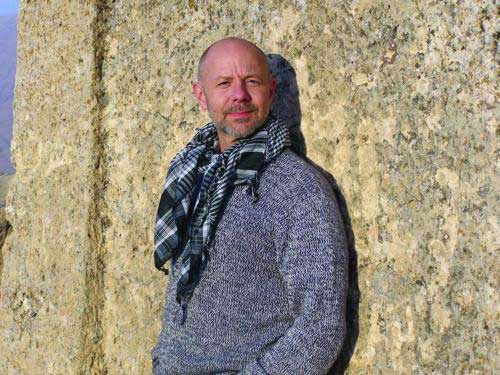Kevin Rumsey (BSc '00) vividly remembers one of the first times he met with a group of elders and other survivors in an Afghan community ravaged by decades of war and extreme poverty. He was sitting on a dusty floor in a mud hut, sipping tea with the group and attempting to explain what he was there to do: provide clean water, sanitation facilities and hygiene solutions for their weary, war-torn town. It was the reaction of those in the gathering that stands out most in Rumsey's memory.
"It was an overwhelming wave of gratitude," Rumsey recalls. "The smiles and sheer joy on all of the people's faces, hands over their hearts, genuine handshakes and sincere thanks – what a privilege to do this kind of work and receive that sort of reaction for it. It was a humbling experience."

Rumsey, who recently concluded his service in Afghanistan, began his time there in November 2008 under the auspices of ACF (Action Against Hunger/Action Contre la Faim) International – a humanitarian organization founded in France in 1979. Active in more than 35 countries worldwide, ACF provides emergency aid and long-term solutions to populations suffering from malnutrition and food security, as well as lack of clean water, sanitation and access to public health. Rumsey first heard about ACF while working toward a master's degree in Peacebuilding at Royal Roads University, but had an inclination toward this line of work much earlier. When the opportunity to work for ACF arose, Rumsey essentially leapt at it.
"I would have gone anywhere. It just happened to be Afghanistan," he says. "ACF gave me the offer and 24 hours to accept or reject it. After a couple of hours of soul-searching, and discussions with family and friends, I accepted."
While in Afghanistan, Rumsey traversed the country, venturing into remote, desolate and often volatile areas to make strides in providing legions of people with some very basic, yet essential services. While the posting wasn't Rumsey's first experience with humanitarian efforts (he previously volunteered on water projects in both east India and Kenya with Rotary International, and worked in post-tsunami Indonesia as an environmental specialist with a private consultation company), it was the first time he had worked in the throws and fallout of a country at war. The dangers didn't deter him. In fact, the risks are part of what attracted him to the job.
"I was drawn to the humanity of instability for some reason," Rumsey says. "The impact for me was knowing that I was living in the moment and making a difference to people in need."
As the coordinator for water, sanitation and hygiene for ACF in Afghanistan, Rumsey was in charge of six projects that will ultimately impact the lives of approximately 170,000 Afghan people. Heading up a 40-member national staff, Rumsey also oversaw the development of funding proposals for new water projects and represented ACF at strategic coordination meetings with various governments and international organizations, including UNICEF.
Rumsey's objective may have been broad – to provide safe water, sanitation facilities and hygiene promotion to vulnerable people – but the tasks toward achieving it were specific and labour intensive. In Kabul, Rumsey and his team put in 100 hand-pump water wells, 300 pour-flush latrines and provided hygiene kits and education to 4,500 families. In Parwan province, the entourage headed up a pipeline project, rehabilitating a reservoir and installing a kiosk network to provide clean water to 7,000 families. In Samangan province, Rumsey laid the groundwork to combat cholera, an outbreak that affected 2,500 people last year.
It was exhaustive and dangerous work with the Taliban shoring up ranks and the risk of kidnapping very high. Suicide bombings were common, and men armed with AK-47s walked the streets as casually as businessmen carry briefcases in any Canadian city. Still, Rumsey felt lucky to be there.
"I met some beautiful people and made many friends," he says. "I admit I was nervous to go, but I felt prepared and excited too."
Rumsey left Afghanistan at the end of April with mixed emotions.
"I leave behind many friends and colleagues who have been very supportive. I leave behind my national staff who has worked so hard. I will miss them very much. I have been so fortunate to have had this experience."
While he acknowledges the challenges for Afghanistan are enormous, Rumsey remains hopeful for the country's future, believing wholeheartedly that a safe, sustainable water supply is the foundation for peace and development.
